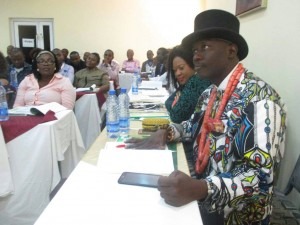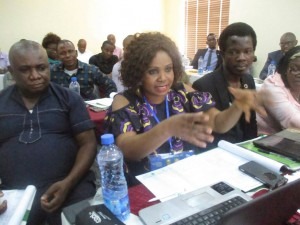On October 25, 2017, Spaces for Change (S4C) convened a consultative meeting in Port Harcourt, Rivers State on the Petroleum Host Community Development Bill, 2016. The meeting brought together 40 leaders of petroleum host communities, women, youth, cultural and non-governmental organizations, including the representatives of state legislative houses, academia and the media.
In his opening remarks, Ledum Mittee, Ex-President, Movement for the Survival of the Ogoni People (MOSOP) and Former Chairman, Nigerian Extractives Industries and Transparency Initiative (NEITI), categorized the legal framework for driving the proposed reforms in the Nigeria’s oil and gas industry into three: (1)Governance, (2) Community and Environmental; and (3) Fiscal Terms. This consultative meeting focuses on the second category: Community and Environmental.
The necessity for a distinct legal framework for enhancing community participation in the Nigerian oil and gas industry and for strengthening environmental protection is premised on the persisting demand for environmental safety in the oil producing areas. For too long, petroleum producing communities have called for the cessation of environmental pollution and for an increased share of the benefits from petroleum industry operations. From this context of pervasive environmental damage linked to oil operations, springs certain expectations regarding the PHCDB. One such expectation among petroleum producing communities unanimously is the shared optimism to have a legal framework that:
- adequately addresses the overarching and interconnected problems of the region, especially poverty, underdevelopment, youth restiveness and environmental pollution.
- Errs on the side of building strong systems and institutions in the oil and gas industry
- Brings about sustainable peace in the areas where oil and gas are produced
With regard to actualizing the agenda of sustainable peace, both the government and the targeted communities need to build consensus on a number conceptual and philosophical expressions. For instance, the concept of peace is not only relative, but also has conflicting connotations. To the government, peace often means ‘free flow of oil without disturbance’. To the communities on the other hand, the term, ‘peace’ often means: ‘ the way oil is exploited is hurting our local environment and traditional livelihoods. Please leave us alone’. Tension can only be avoided where both sides pay attention to the each other’s legitimate concerns and take steps to resolve them. It is hoped that the PHCDB will make strident efforts to bridge this communication gap.
Another concern requiring policy attention relates to the predominant use of the term, host communities. Referring to communities where oil is produced as ‘host communities’ is seemingly condescending. This is because, the term, host communities, does not confer ownership, but rather, emphasizes a peripheral hosting of installations and facilities. As with the international body of Oil Producing Exporting Countries (OPEC), membership is based on oil production, not hosting, and this standard should be applied in the domestic context. The term, petroleum-producing communities, was therefore, unanimously affirmed to be a more appropriate appellation.
Victoria Ohaeri, the executive director of Spaces for Change’s (S4C’s) welcome remarks elucidated the history of the PHCDB, including the parent legislation, the Petroleum Industry Bill (PIB). The PIB has suffered setbacks to its passage for over 17 years, beginning from April 2000. To overcome the historical setbacks to the Bill’s passage, the PIB has been split into a number of distinct legislations, which currently include the Petroleum Industry Governance Bill (PIGB) and the Petroleum Host Community Development Bill (PHCDB).
The new approach of splitting the bill into distinct parts has recorded some progress, rekindling hope among stakeholders. In May 2017, Nigerian’s upper legislative chamber, the Senate, passed the first of the bills, the Petroleum Industry Governance Bill. Although Nigeria’s House of Representatives has yet to concur with the Senate, it has announced plans to integrate the PHCDB into the substantive petroleum reform regime, instead of passing it as a distinct legislation. The PHCDB seeks to provide a framework that guides cost and benefit sharing amongst the government, petroleum exploration companies and petroleum host communities. The major objective of the bill is to strengthen the participation of communities hosting oil and gas production in petroleum resource governance.
The diversity of representatives of petroleum-producing communities represented at the consultative meeting were drawn from the four oil-rich states of Akwa-Ibom, Bayelsa, Rivers, and Delta. They include:
LGA/State Oil company operating in the area
– Ibeno, Akwa-Ibom State – Exxon Mobil Unlimited
– Eket, Akwa Ibom State – Exxon Mobil, Total FinaElf
– Krakama, Rivers State – Eroton, SHELL Petroleum Development Company (SPDC)
– Gokana, Rivers State – SPDC
– Degema – SPDC
– Ekpan, Delta State – Oil Refinery and Petrochemical Company/Nigeria Gas Company
– Rumuegbe, Rivers State – Shell, AGIP
– Emohua, Rivers State – Total PLC and Eleme Petrochemical Company
– Ekpetiama, Bayelsa State – SPDC
– Bodo, Rivers State – SPDC






















